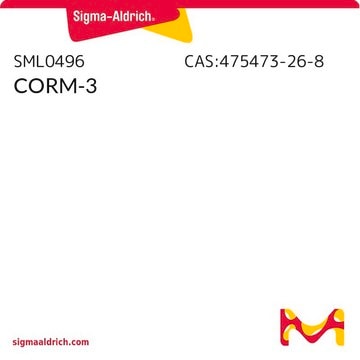SML0315
CORM-A1
≥95% (NMR)
Synonym(s):
Sodium boranocarbonate
Sign Into View Organizational & Contract Pricing
All Photos(1)
About This Item
Empirical Formula (Hill Notation):
CH3BNa2O2
CAS Number:
Molecular Weight:
103.82
MDL number:
UNSPSC Code:
12352200
PubChem Substance ID:
NACRES:
NA.77
Recommended Products
assay
≥95% (NMR)
form
powder
storage condition
desiccated
color
white to beige
solubility
H2O: >15 mg/mL
storage temp.
room temp
SMILES string
[Na+].[Na+].[BH3-]C([O-])=O
InChI
1S/CH4BO2.2Na/c2-1(3)4;;/h2H3,(H,3,4);;/q-1;2*+1/p-1
InChI key
SOFPSQNQOQPAAJ-UHFFFAOYSA-M
Application
CORM-A1 has been used:
- to deliver carbon monoxide (CO) and to test its cytoprotection in yeast and primary astrocytes culture during oxidative stress
- as CO donor in murine macrophages J774A.1 cells to test its effect on cellular β-endorphins elevation
- to test its effect on mitophagy activation in retinal ganglion cells
Biochem/physiol Actions
CORM-A1 is a water-soluble carbon monoxide (CO) releasing molecule that can be used to study the effects of CO on cellular systems. Carbon monoxide (CO), produced during the degradation of heme by the enzyme heme oxygenase is an important gaseous signaling mediator in mammalian cells CORM-A1 has anti-oxidant and anti-inflammatory activity.
It mediates the release of CO in a pH and temperature-dependent manner, thus favoring mild vasorelaxation and hypotension. During oxidative stress, CORM-A1 is reported to provide cytoprotection in astrocyte primary cultures. This boron-containing CORM promotes autophagy.
Storage Class
11 - Combustible Solids
wgk_germany
WGK 3
flash_point_f
Not applicable
flash_point_c
Not applicable
Certificates of Analysis (COA)
Search for Certificates of Analysis (COA) by entering the products Lot/Batch Number. Lot and Batch Numbers can be found on a product’s label following the words ‘Lot’ or ‘Batch’.
Already Own This Product?
Find documentation for the products that you have recently purchased in the Document Library.
Customers Also Viewed
Helena Parfenova et al.
American journal of physiology. Heart and circulatory physiology, 315(4), H978-H988 (2018-07-22)
Neonatal asphyxia leads to cerebrovascular disease and neurological complications via a mechanism that may involve oxidative stress. Carbon monoxide (CO) is an antioxidant messenger produced via a heme oxygenase (HO)-catalyzed reaction. Cortical astrocytes are the major cells in the brain
Sara R Oliveira et al.
The European journal of neuroscience, 52(1), 2771-2780 (2020-03-14)
Previous studies about the modulation of the vasculature by CO were performed exclusively in male or sexually immature animals. Understanding the sex differences regarding systemic drug processing and pharmacodynamics is an important feature for safety assessment of drug dosing and
Jianxiong Liu et al.
Pediatric research, 82(5), 881-887 (2017-07-01)
BackgroundThe potential contribution of sex-related variables to cerebrovascular functions in neonates remains elusive. Newborn piglets provide a translationally relevant model for studying the effects of seizures in the neonatal brain. The present study investigated whether sex differences contribute to cerebrovascular
Bhavisha A Bakrania et al.
American journal of physiology. Regulatory, integrative and comparative physiology, 314(3), R427-R432 (2017-12-08)
Preeclampsia is a pregnancy-specific disorder of maternal hypertension and reduced renal hemodynamics linked to reduced endothelial function. Placental ischemia is thought to be the culprit of this disease, as it causes the release of factors like tumor necrosis factor (TNF)-α
Myrna Constantin et al.
International journal of hypertension, 2012, 859235-859235 (2012-04-21)
Heme oxygenase (HO), a catabolic enzyme, provides the rate-limiting step in the oxidative breakdown of heme, to generate carbon monoxide (CO), iron, and biliverdin-IXα. Induction of the inducible form, HO-1, in tissues is generally regarded as a protective mechanism. Over
Our team of scientists has experience in all areas of research including Life Science, Material Science, Chemical Synthesis, Chromatography, Analytical and many others.
Contact Technical Service















